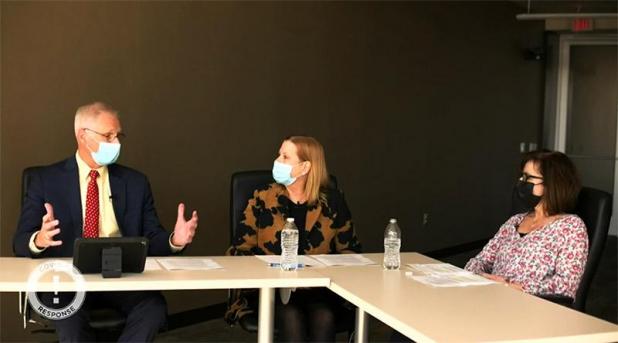
(Ochsner Health Screen Capture
Ochsner Health Chief Medical Officer Dr. Robert Hart speaks during a Facebook live session Friday. Dr. Sandra Kemmerly, center, the hospital system’s medical director of hospital quality and an infectious disease specialist; and Dr. Robin Bone, head of the OB/GYN Department at Ochsner Baptist in New Orleans, look on.
Weighing risk posed by vaccine: Experts recommend COVID shots for pregnant women
Pregnant women are not more likely to contract COVID-19, but the risks if they do contract the virus are higher.
Dr. Robin Bone, head of OBGYN at Ochsner Baptist in New Orleans said in a Facebook live event offered by the health system Friday that pregnant women are at a higher risk of being admitted to the Intensive Care Unit, being put on a ventilator or having issues with clotting.
While the risk are high, the Centers for Disease Control and Prevention, the American College of OBGYN, the American Society of Maternal Fetal Medicine and the Society of Reproductive Medicine have said jointly that vaccines do not cause infertility, and they should be used by pregnant women and those who are breastfeeding.
“They’ve all taken the stance that you should absolutely weigh the individual risk factors to the patient as well as a mutual decision with their physician on whether or not these pregnant women should get the vaccine,” Bone said.
Starting Monday, Louisiana has opened the vaccine to more of its population, which includes expecting mothers.
Bone noted that 15,000 pregnant women, many working in healthcare, have been vaccinated as of Jan. 20, with zero complications experienced.
She said she thinks confusion arose due to the original trial of the Pfizer-BioNTech vaccine, where 37,000 people were vaccinated, but pregnant women and children were excluded. She said those exclusions are normal in a vaccine trial.
However, Bone said 23 women — half who were given the vaccine and half the placebo in this trial — became pregnant.
“They followed those women out in that Pfizer trial, and there’s been no problems at all there, either,” Bone said.
While Pfizer was not originally studying pregnant women, it has begun doing so with a trial.
“Because I think as time goes on, they’re going to prove and show this vaccine is safe in pregnant women, and they’re going to have the data to back it up,” Bone said.
For those who are breastfeeding, the nutrients in the antibodies are believed to be passed to their children, too, Bone said.
She said she understands a mother’s worry about potentially harming her unborn child by receiving a vaccine. Bone said she asks her patients if they feel safer for themselves and their baby getting the vaccine or not.
She noted what they know about the vaccine is that it appears safe for this segment of the population.
“Whereas there’s so many more unknowns about getting COVID itself,” Bone said.
The Pfizer-BioNTech and Moderna vaccines are 95% effective against the virus with two-dose shots taken weeks apart, while a single-dose Johnson and Johnson vaccine, which has been proposed but hasn’t been authorized by the U.S. Food and Drug Administration yet, is nearly 70% effective, said Dr. Sandra Kemmerly, Ochsner Health System medical director of hospital quality and an infection disease specialist.
She said both vaccines on the market are safe, while data from Johnson and Johnson indicates it is, too.
While the technology used in the development of the COVID vaccines may be new for COVID vaccines, it has been around for a long time, Kemmerly said.
“We know that it’s really good technology,” she said.
There were other factors that expedited vaccine development process.
With genome sequencing of the virus available, the process was undertaken and made available publicly.
“So with the Pfizer and the Moderna trials, the companies knew what the recipe was, so to speak, and they made vaccine all the while they were designing, and planning and conducting clinical trials,” Kemmerly said.
Another key factor is the amount of people available to test the vaccine on in clinical trials, something that normally takes many years because they are not being developed during a pandemic, she said.
